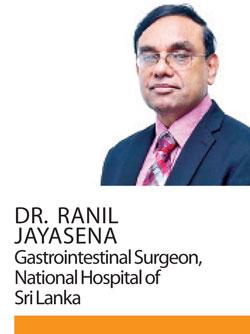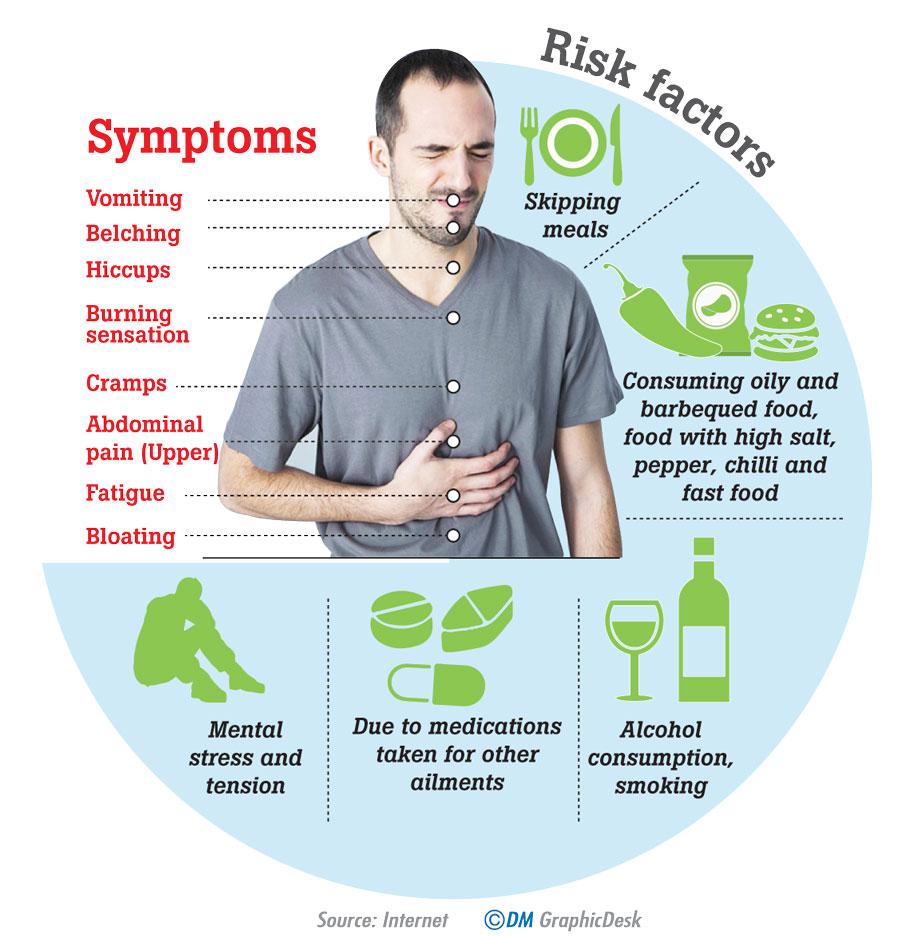Reply To:
Name - Reply Comment

Oily and barbequed food, food with high salt along with pepper and chilli should also be avoided
Extremes of the disease may include vomiting blood, black stools and ulcer perforations known as peritonitis
Longstanding gastritis can also lead to the development of cancer and gastric carcinoma
 It can be stated that 60% of Sri Lankans have experienced gastritis at some point in their lives. The common age group that remains susceptible to gastritis is the active age group i.e. from the age of 18 to the age of 40. In addition, now gastritis indicates an increasing trend among young children. In this week’s edition of the Health Capsule we spoke to Dr. Ranil Jayasena, Gastrointestinal Surgeon at the National Hospital of Sri Lanka on this alimentary ailment that scorches up the stomach.
It can be stated that 60% of Sri Lankans have experienced gastritis at some point in their lives. The common age group that remains susceptible to gastritis is the active age group i.e. from the age of 18 to the age of 40. In addition, now gastritis indicates an increasing trend among young children. In this week’s edition of the Health Capsule we spoke to Dr. Ranil Jayasena, Gastrointestinal Surgeon at the National Hospital of Sri Lanka on this alimentary ailment that scorches up the stomach.
There are many causes that lead to gastritis. “Gastritis can be inflicted upon a person as a bacterial infection. The bacteria Helicobacter pylori responsible for causing gastritis, is transmitted through contaminated food and water. This is a common cause in the rise in gastric patients in Sri Lanka.The unhygienic preparation of food, meals from shops and fast food may be contaminated with this bacterium and could cause infection. Contaminated water can also cause the spread of these bacteria,” stated Dr. Jayasena.

“Alcohol consumption and smoking are also other dominant factors that have led to a rise in gastritis patients; especially resulting in stomach ulcers, which are a further aggravation of the condition,” he warned. People above the age of 40 are prone to succumb to the gastric threat due to medications taken for other ailments such as pressure, diabetes, cholesterol and backache. Medicines that are taken for these long standing conditions are usually non-steroidal and non-inflammatory drugs such as pain killers. These stimulate excess secretion of acid in the stomach which could result in stomach injury and leave the individual with gastritis.
Dr. Jayasena accentuated that in the past, gastritis was a condition that did not exist among children. However gastritis is commonly seen in children at present. “This is most often due to the consumption of fast food, takeaways or canteen food. Socio- economic conditions may also have led to these instances when both the parents are at work and there is no one at home to prepare healthy meals. The child will be accustomed to fast food which can cause gastritis. Most of the time children either tend to skip breakfast or have a rushed breakfast to get to school in a hurry, to catch the bus, trains, etc. When children have a rushed breakfast they may not chew their food properly and swallow food in huge chunks. This leaves the younger age groups susceptible to gastritis,” he stressed.
Some people show lactose intolerance to milk proteins in dairy products, which causes them to get puffed up, bloated, accompanied by belching and diarrhoea

The inner lining of the stomach, the mucosa, is able to withstand a normal amount of acid under healthy conditions. However alcohol consumption, smoking, nauseous drugs, erosions due to inflammations result in an unhealthy mucosa. This abnormal mucosa is unable to withstand the normal amount of acid which leads to injuries in the stomach and ultimately gastritis. However a normal healthy mucosa is unable to withstand an increased amount of acid beyond the normal level. According to the Gastrointestinal Surgeon, increased acid secretions of the stomach may be predominantly due to severe mental stress among other causative factors as well. “Maximum acid is secreted during breakfast, lunch and dinner time, which is why we feel hunger mostly at these times. If the stomach is empty with no food or water to dilute the acid, it causes harm to the stomach lining and the mucosa is left vulnerable to erosions,” he elaborated.
The common symptom irrespective of the cause and the site of the lesion is pain. Sometimes other complications in the alimentary canal can lead to misinterpretation of the condition as gastritis. Symptoms vary with the site of lesion. “Gastroesophageal reflux disease, duodenitis, peptic ulcer diseases and hiatal hernia are disease conditions that produce symptoms such as severe pain, tightening pain in the chest. Sometimes these conditions are mistaken by the patients for heart disease. Additionally gas may surface resulting in bitterness in the mouth due to regurgitations, frequent attacks of rhinoceritis, laryngitis, headaches and various respiratory problems. These conditions can be misinterpreted as gastritis,” explained Dr. Jayasena. Therefore medical attention should be sought to correctly diagnose the disease. However gastritis causes a burning pain or a severe constriction kind of sensation. An exaggerated feature would be frequent hunger pangs amids unusual constriction and tightening of the stomach. Hunger pains especially become stronger during the meal times which could indicate gastritis.
With the various gastric disease conditions sharing common symptoms, an endoscopy has to be performed in order to diagnose the exact ailment. Addressing the complications of gastritis, Dr. Jayasena said that the gastritis condition very rarely aggravates. “Extremes of the disease may include vomiting blood, black stools and ulcer perforations known as peritonitis. Longstanding gastritis can also lead to the development of cancer and gastric carcinoma,” he warned.
The treatment varies according to the cause from which gastritis stems. Therefore it is essential that the cause is first identified upon which the treatment would be based and planned. If the problem is identified to be due to bile, medicine will be prescribed to dilute bile or remove the bile secretions. If the gastric condition arises due to bacterial infection, antibiotics will be prescribed. If gastritis is due to acid secretions, antacids will be prescribed. Antacids can be categorised into three different types; drugs that block and minimise acid secretions, drugs that inhibit the proton pump mechanism in the stomach responsible for the secretion of acid and drugs that neutralise the acid. This includes basic drugs such as aluminium hydroxide and sodium hydroxide. Dr. Jayasena spoke about special cases that cannot be treated through medicine and require surgery. “Hiatal hernia is one such condition. The solution here is the restoration of an anatomical position (when the stomach is pushed into the chest cavity due to issues in the abdominal wall) which cannot be achieved through medicine. Due to modern technology a person does not have to be cut open in order to correct the fault. This can be treated laparoscopically, which is a form of keyhole surgery. A patient can recover within a short period of time and resume with the normal lifestyle quickly,” he assured.
Gastric patients should be mindful and pay attention to what they eat. There are certain foods that gastric patients should avoid. This includes food that contains caffeine, alcohol, cocoa. “Oily and barbequed food, food with high salt along with pepper and chilli should also be avoided. Spices may even have to be avoided in severe cases. Some foods are not easily digestible naturally. These kinds of food should also be avoided as it imparts more work on the stomach causing more acid secretions that would not be beneficial under gastric conditions. Such tough food includes meat, manioc,” informed Dr. Jayasena. There always exists confusion when it comes to considering whether it is safe to consume dairy products under gastric conditions. It has been affirmed that dairy products, which contain milk proteins is generally not bad for the stomach in normal quantities. However Dr. Jayasena stressed that large amounts may not be recommended. “The suitability of dairy products for consumption varies from person to person. Some people show lactose intolerance to milk proteins in dairy products, which causes them to get puffed up, bloated, accompanied by belching and diarrhoea. Their gastric conditions are further aggravated,” he explained. Therefore it depends on the person. “It is also important to ensure that the food is chewed well. Otherwise when larger food particles enter the stomach it loads more work on the stomach to break down the food which causes increased secretions of the acid in order to digest the food,” he further added.
Therefore in order to prevent the infliction of gastric conditions in this modern day and age where a busy lifestyle rules a person’s quality of life, it is necessary to pay attention to oneself and ensure the consumption of healthy, hygienically prepared meals with clean drinking water in addition to attempts made to lead a stress-free life.